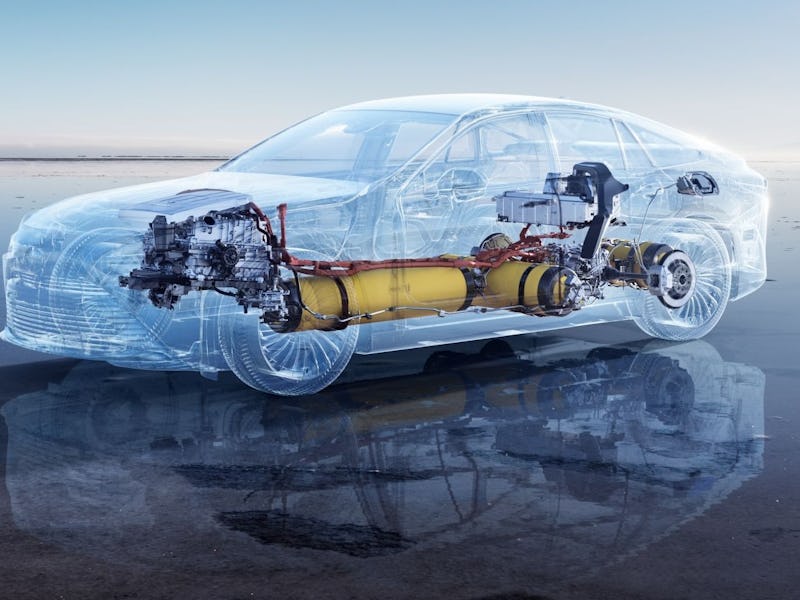3 Ways Toyota’s Promising Mirai Hydrogen EV Has Already Stalled Out
It looks like battery-powered EVs don’t have anything to worry about.

In theory, the Toyota Mirai sounds like a great deal. It’s a hydrogen-powered EV that has a 402-mile range and takes less than five minutes to refuel. Still, Toyota introduced the Mirai back in 2015 and it has failed to gain any real traction within the world of EVs. Now more than ever, Mirai owners are getting fed up with a whole host of problems that come with buying Toyota’s hydrogen car.
In reality, Mirai owners are constantly dealing with the lack of refueling stations. If they do find one, it’s a struggle to find a pump that actually works, according to a report by InsideEVs. The Mirai has become such a burden to deal with that some owners have even filed a lawsuit. Here’s how Toyota’s ambitious plans for its Mirai have, so far, failed to materialize.
1. Lack of Infrastructure
There aren’t enough hydrogen refueling stations to go around and it’s only getting worse.
Even though the Mirai might be a solid EV, the disastrous infrastructure has led to many headaches for owners. Hydrogen-powered EVs were once touted as a serious competitor to their battery-powered counterparts because of how fast they could refuel. Unfortunately, Mirai owners are running into so many issues that they could be stuck at a refueling station for way longer than the advertised five minutes.
According to the InsideEVs report, owners have to deal with pumps that only partially refuel their Mirai’s tanks or the pump physically freezing to the EV. One owner told the publication that a Mirai owner could “spend one hour at the pump to fill up to 100% if the driver comes to the station with less than 30% in the tank.”
What’s worse, you only get to experience all these issues if you’re able to locate a hydrogen refueling station in the first place. According to the U.S. Department of Energy’s Alternative Fuels Data Center, there are only roughly 56 stations in the U.S., which are mostly in California right now. Not to mention, filing up a Mirai’s tank could cost you somewhere north of $200 right now.
2. Confusing Pricing Model
The Mirai’s retail price is a far cry from its resale value.
Currently, the base XLE model 2024 Mirai costs $50,190 while the more expensive Limited trim starts at $67,115. That’s an expensive sticker price, especially compared to similar battery-powered EV options like the Tesla Model 3’s Long Range trim, which starts closer to $47,000.
To make that retail price more palatable, Toyota recently offered a rebate worth up to $40,000 for its Mirai Limited trim, knocking it down to around $27,000. Strangely enough, the XLE model only gets a $22,000 rebate, making it more expensive than the more premium option. That’s a wild discount that feels like Toyota is adjusting the price after the fact to desperately attract new buyers.
Those deep rebate offers can be followed up with a $15,000 hydrogen fuel card that comes with the Mirai, which is good for six years if you buy it, or three years if you lease. With all those discounts and incentives, we have to point out that the Mirai has depreciated heavily in the end, with a lot of the previous model years going for around $10,000 on used car sites.
3. Unhappy Customers
A lot of Mirai owners feel duped into the promise of a seamless hydrogen-powered EV.
It seems most Mirai owners didn’t do enough homework before buying, but we can’t put all the blame on customers. While it wouldn’t be great for sales, Toyota should be more transparent about the growing pains that come with buying a hydrogen-powered EV.
Instead, some owners are planning to lodge a complaint to Toyota requesting rental car replacements and reimbursement for refueling woes, which Toyota has done before. On a more serious note, other owners suggested that Toyota should buy back the Mirais, while others have taken legal action.
Jason Ingber, an attorney who’s represented owners filing suit against Toyota and its Mirai, told InsideEVs that there was a class action lawsuit with 30 owners on it and another 20 potential clients who have reached out about the same thing.
With all this piling up, it makes sense why Toyota is planning to switch its hydrogen fuel cell EV development from consumer cars to commercial vehicles. The question remains if these commercial-focused EVs will run into the same problem, though.